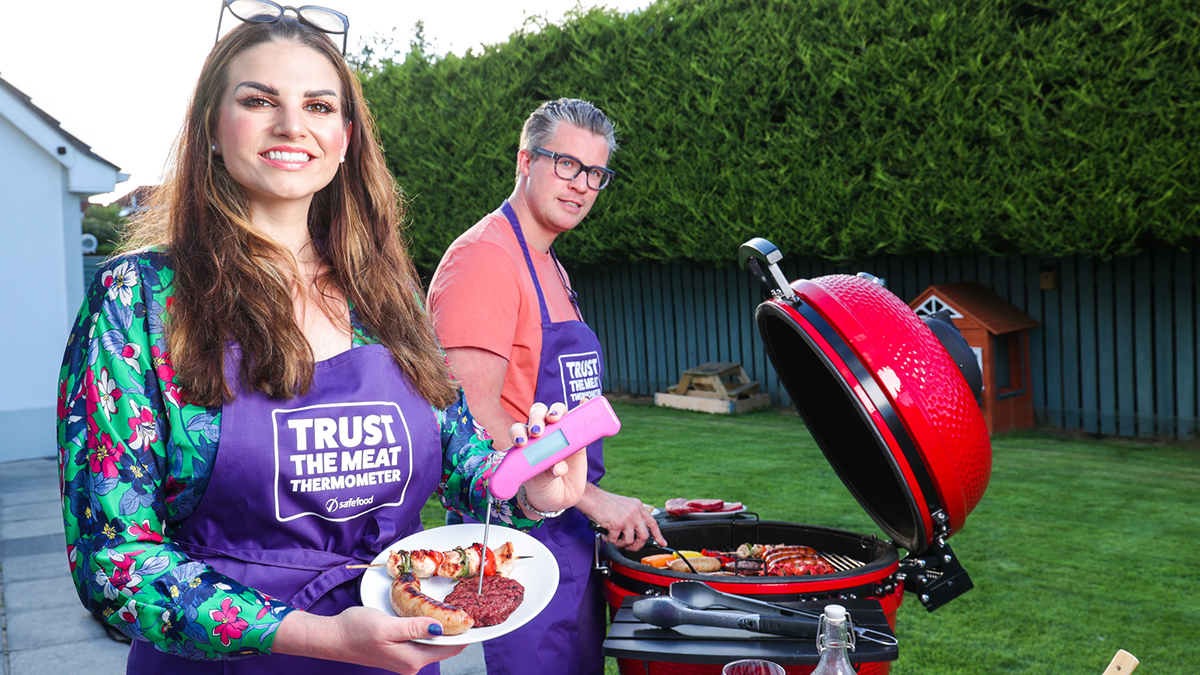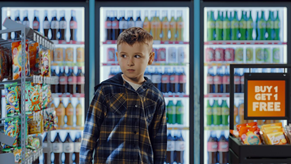Home barbecue cooks need to ‘Trust the Meat Thermometer’
.jpg?w=1200&h=675&ext=.jpg&width=1360&resizemode=force)
safefood encourages people to ‘Trust the Meat Thermometer’ when cooking a barbecue this August Bank Holiday weekend
Tuesday 23rd August 2022: More than half of Northern Ireland’s home barbecue cooks (55%) are putting their friends and family at risk of food poisoning this August Bank Holiday weekend by not knowing how to barbecue meat to the correct temperature.
So, if you're planning a August bank holiday weekend barbecue, safefood is encouraging people to make sure they have a meat thermometer at the ready to avoid a barbecuing food safety catastrophe.
According to new research by safefood, over half (57%) of the 1,000 surveyed adults across Northern Ireland believe that the hardest part of cooking a barbecue is knowing when the meat is cooked thoroughly, with almost half (48%) saying the most challenging aspect is trying not to burn the food.
Over a quarter of respondents (29%) said that giving themselves enough time to heat the barbecue was the hardest task of barbecuing, with almost 1 in 5 people (19%) finding it difficult to separate barbecue cooking utensils for raw and cooked foods.
safefood is calling on home cooks to up their grill game and ‘Trust a Meat Thermometer’ to take the guess work out of cooking barbecue meat this August Bank Holiday and protect their family and friends from a barbecue cooking disaster.
The all-island food safety body is advising cooks to get it right by double checking that their burgers, chicken, and sausages are cooked to 75 degrees Celsius on the barbecue - even if they are experienced at barbecuing. Currently one in four (25%) local home barbecue cooks say they use a meat thermometer to ensure they get the temperature of barbecued meats like burgers, chicken, and sausages just right before serving to guests.
The most common food safety measures used by local home cooks to check if their barbecue meat is cooked properly are cutting into the meat to see if it looks cooked (67%), checking to see if the juices run clear (48%), and checking there is no pink meat (44%).
Dr Gary Kearney, Interim CEO at safefood said:
“Whether you’re an expert grill master or a novice barbecue cook, if there’s one item to incorporate into your barbecue this Bank Holiday, it’s a meat thermometer. Take your food off the heat, pop the thermometer in the thickest part of the meat and when it reaches 75 degrees Celsius, then it’s cooked and ready to eat.
“For meats like burgers, sausages, chicken, and kebabs, it is important that they are cooked until piping hot, with no pink meat and the juices running clear. Using a meat thermometer adds that extra layer of reassurance. If you’re cooking steaks, these can be cooked to preference.”
Dr Linda Gordon, Chief Specialist in Food Science at safefood said:
"What was interesting from our research was the low level of meat thermometer ownership and usage. We also know that people perceive meat thermometers as being expensive or only used by expert cooks. However, they are a fool-proof tool, easy to use, can be purchased for as little as £8-£10 and are widely available from home-retail and hardware outlets.
Supporting the campaign is Radio Presenter, Jordan Humphries and local Head Chef, Ben Arnold, who says:
“Who doesn’t love a relaxed, fun barbecue with friends and family? Not surprisingly Northern Ireland’s most popular barbecue favourites are sausages, burgers, and chicken but our enduring love affair with barbecued meats means a real risk of food poisoning if we aren’t temperature aware.
"Serving up food that isn’t cooked properly is every home cook’s worst nightmare! To avoid a complete barbecue cooking disaster that could make friends and family sick, we would encourage everyone to up their grill game by using a meat thermometer. This will help take the guess work out of cooking barbecue meat to the required 75 degrees Celsius and ensure you are a barbecue star this bank holiday weekend.”
For more information visit www.safefood.net/news or follow safefood on Facebook, Twitter & Instagram.
safefood’s 7 top tips for a safe barbecue
1. Keep perishable foods like salads, coleslaw, and quiche in your fridge until you are ready to serve them.
2. Burgers, sausages and kebabs, pork and poultry must be cooked all the way through – take your food off the heat, pop the thermometer in the thickest part of the meat and when it reaches 75 degrees Celsius, then it’s cooked and ready to eat. Steaks can be served 'rare' as harmful bacteria are on the outside only (and not in the centre). If you don’t have a meat thermometer, follow the three checks of ensuring bbq meats like burgers, sausages and chicken are cooked until piping hot, with no pink meat and the juices running clear.
3. If you like to marinate your meat, make sure any marinade used on raw meat is not then used as a sauce to coat vegetables or cooked meat as it will contain raw meat bacteria.
4. If you choose to barbecue any frozen food, it must be completely thawed first on the bottom shelf of your fridge before you cook it.
5. When handling raw meat and poultry, wash your hands thoroughly and frequently, most importantly before going on to prepare salads and other ready to eat foods. 6. Once your meat is cooked thoroughly, make sure to keep cooked meat separate from raw meat and to use separate chopping boards, cooking utensils and plates. Harmful bacteria in raw meat, poultry and their juices can cross contaminate cooked food and lead to food poisoning, something your family won’t thank you for.
7. If there are leftovers from your barbecue, allow the food to cool before refrigerating, however make sure to refrigerate food within two hours of cooking. Always remember with leftovers - if in doubt, throw it out.
Ends
For more information or to request an interview, please contact:
ASG
Russell Lever
Mob: 077 8828 8901
Email: [email protected]
Or
safefood
Dermot Moriarty
Mob: +353 86 381 1034
[email protected]
References: Omnibus survey of 1,000 adults aged 18+ in Northern Ireland. (Cognisense Research; July 2022)




